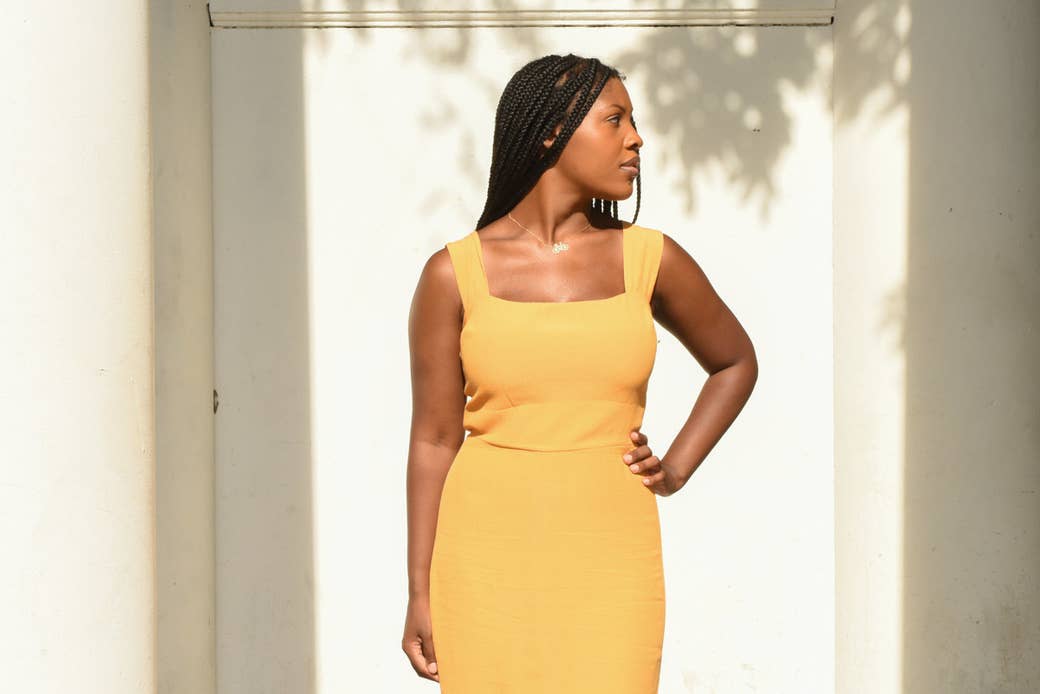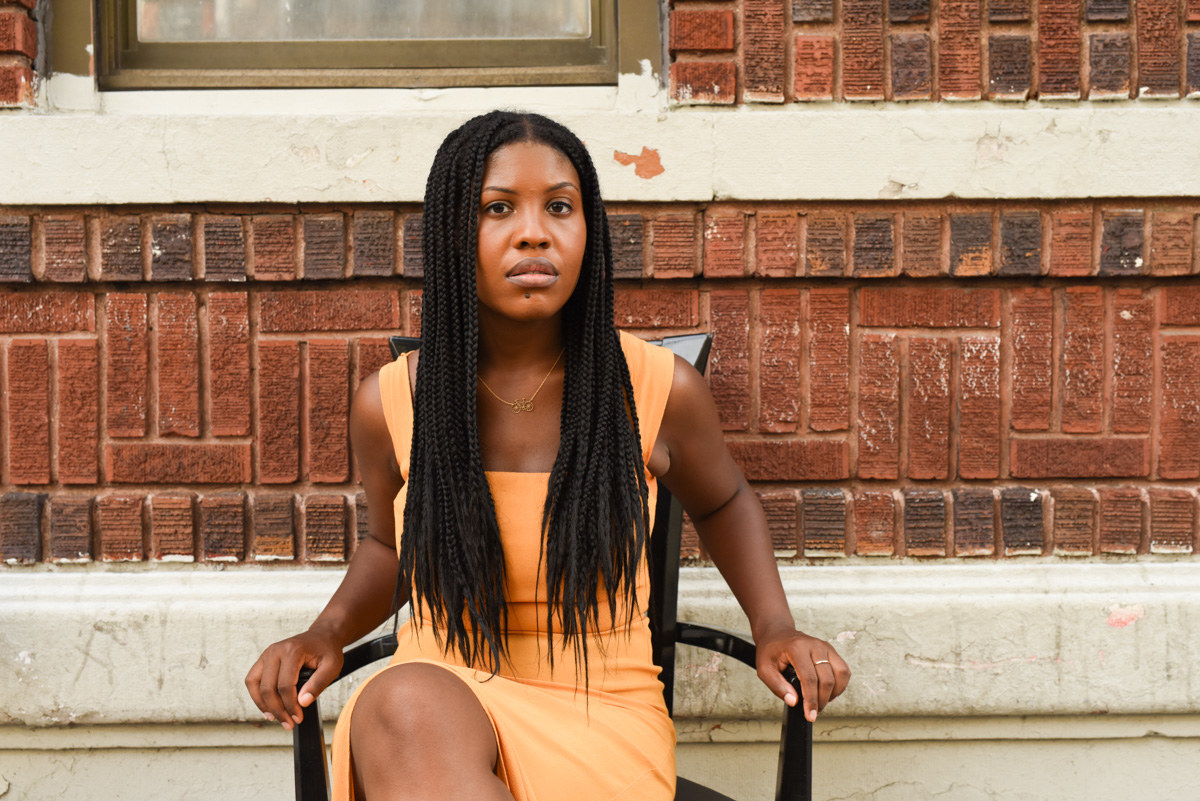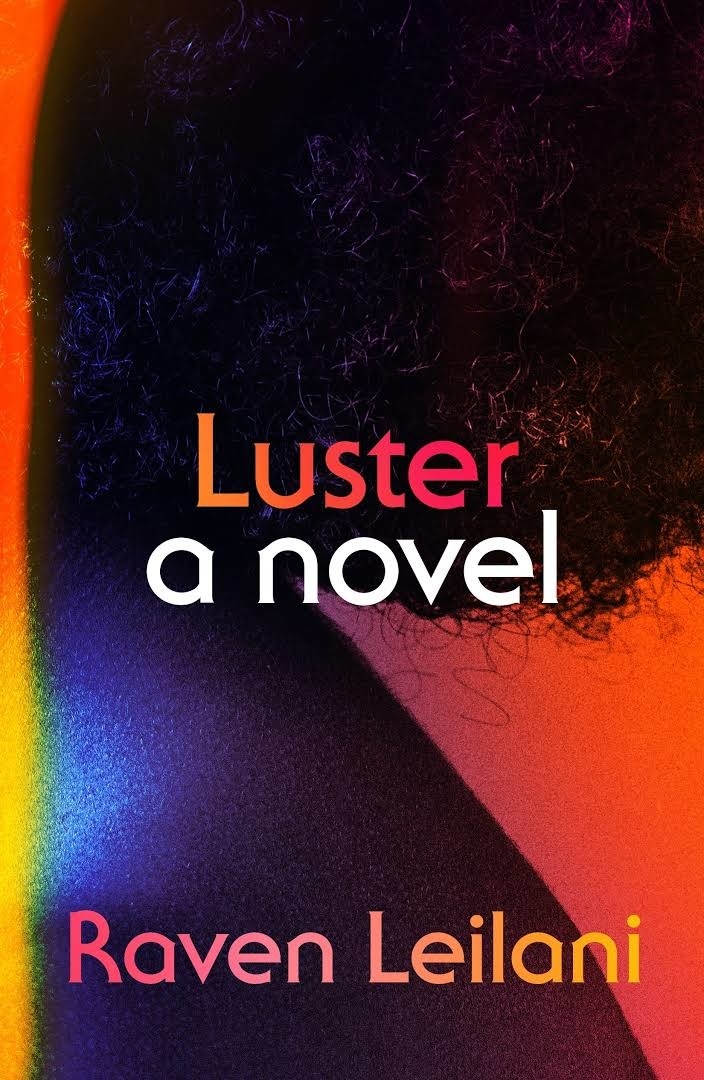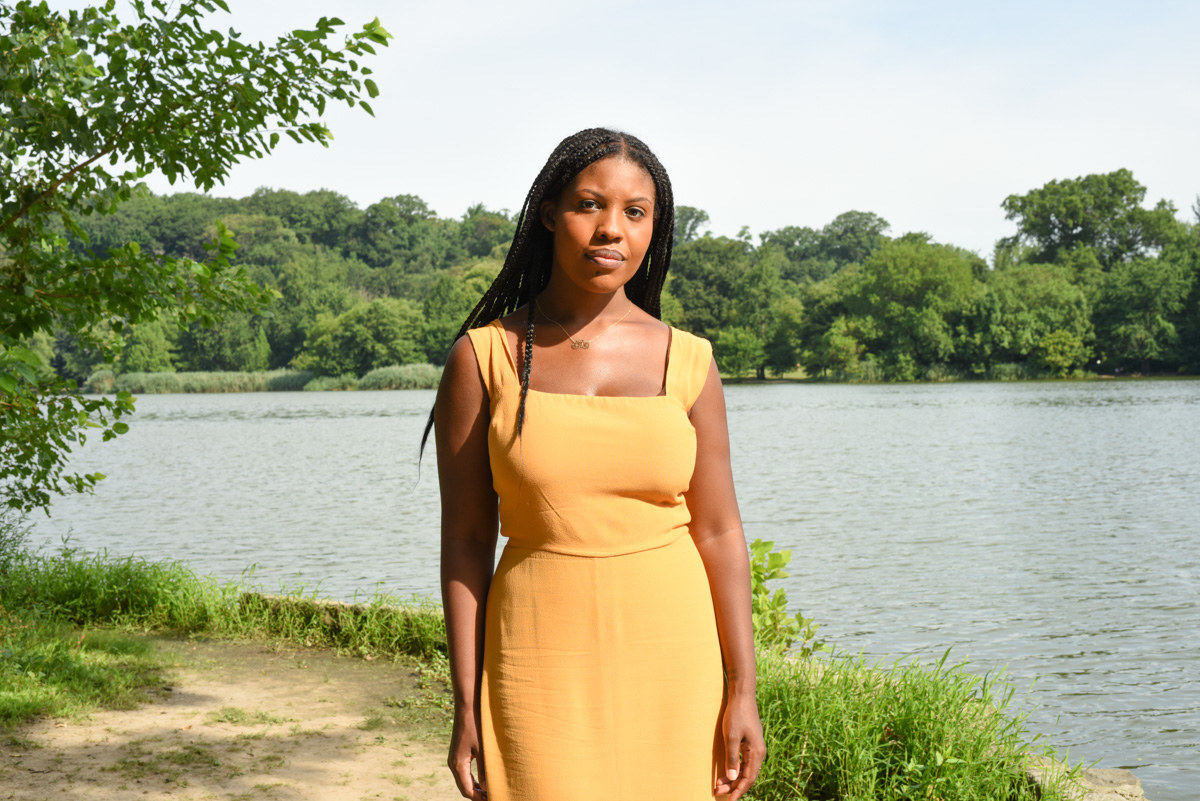
“Here’s a fact,” Edie, the 23-year-old narrator of Luster, one of the most unsettling, scathingly funny debut novels of the year, tells us early in the book: “I have great breasts, which have warped my spine. More facts: My salary is very low. I have trouble making friends and men lose interest in me when I talk.” Edie lives in New York City and works in book publishing as a managing editorial coordinator; she paints but can’t seem to get any real career traction on that front. The only meaningful difference in status between her and the other Black girl at work is “one monthly student loan payment.”
We first meet Edie when she is about to go on her first IRL date with Eric, a middle-aged white archivist from New Jersey who’s in an open marriage. Over the course of a taut 222 pages, Edie becomes ensnared in a peculiar living arrangement with Eric, his wife Rebecca, who’s a grimly determined medical examiner, and their adopted Black adolescent daughter Akila.
All the hallmarks of a sacred millennial text are in this book: There is sex, some of it good, plenty of it bad (“When we have sex it lasts so long that in the middle of it, when it has become less about feelings and more about ETA, we look at each other and call it”); crappy gig economy jobs (“I ride my bike to an address in Sunset Park and when the customer comes to the door, she snatches the bag of waffle fries and doesn’t tip”); and financial precarity (“With a new diet of pear baby food and Top Ramen, I make almost enough money to live”).
In that sense, Luster is a book squarely in the tradition of recent buzzy novels about disaffected twentysomething women trudging through our capitalist hellscape, from Ottessa Moshfegh’s My Year of Rest and Relaxation to Halle Butler’s The New Me to, yes, that bard of millennial angst and repression, Sally Rooney, and her novels Conversations with Friends and Normal People.
“I wanted to write a Black woman who is dogged and hungry and who fucks up.”
But there are two notable ways in which Luster, written by the 29-year-old Raven Leilani, differs. First, the obvious: Edie is Black.
“When we’re talking about the sort of dysfunctional urban hungry woman, what we’re generally talking about is the white millennial experience,” explained Leilani in a video chat in mid-July. “I wanted to write a Black woman who is dogged and hungry and who fucks up.”
For Leilani, “millennial” is not a dirty word. “I’m a millennial and Edie is a millennial and there are definitely trappings of the millennial novel,” she said. “My book indulges them; they are definitely there.”
But like all great books, Luster eludes easy categorization. It’s a slippery novel about many things — being young, being Black, being a woman, being depressed, feeling lonely, latent trauma, sex. Which brings me to my second point. What is so immediately striking about Luster — and what sets it apart from the glut of millennial fiction — is the quality of the writing itself.
The book is full of disarming one-liners (“There are times when I interact with kids and recall my abortion fondly”) and also stunning run-on sentences:
Slowly, he eases me down onto his grand, slightly left-leaning cock, and for a moment I do rethink my atheism, for a moment I consider the possibility of God as a chaotic amorphous evil who made autoimmune disease but gave us miraculous genitals to cope, and so I fuck him desperately with the force of this epiphany and Eric is talkative and filthy but there is some derangement about his face … I am looking around the room and there is a bathroom attached, and in the bathroom are what look to be extra towels and that makes me so emotional that he pauses and in one instant a concerned host rises out of his violent sexual mania, slowing the proceedings into the dangerous territory of eye contact and lips and tongue where mistakes get made and you forget that everything eventually dies, so it is not my fault that during this juncture I call him daddy and it is definitely not my fault that this gets him off so swiftly that he says he loves me and we are collapsing back in satiation and horror, not speaking until he gets me a car home and says take care of yourself like, please go, and as the car is pulling away he is standing there on the porch in a floral silk robe that is clearly his wife’s.
What range Leilani displays in this sentence, and so seamlessly and propulsively. The whole book reads this way: a squirm-inducing marvel.
The publishing world has taken notice. Leilani signed with her agent while still completing her MFA at New York University. Zadie Smith was Leilani’s thesis adviser and not only has she blurbed the book (“It’s brutal — and brilliant”), she wrote an essay for the February issue of Harper’s Bazaar (only available in print) further singing Leilani’s praises: “None of the familiar categories, women’s writing, millennial writing, African American fiction, could quite express or contain the book I was reading, which with the lightest of touches, skewers our contemporary moment, and announces a writer of exhilarating freedom and daring.”
And Smith isn’t the only fan. Other writers such as Mary Gaitskill, Kaitlyn Greenidge, Ling Ma, Brit Bennett, Carmen Maria Machado, Garth Greenwell, Alexander Chee, and Angela Flournoy have all raved about Luster, and it’s been long-listed for the Center for Fiction’s first novel prize. When I read it back in February, I felt called to evangelize about it to everyone I knew.

A book written in the first person that is so brazenly vulnerable naturally invites curiosity about its author. (You can’t read a book so intimately acquainted with the specific, sexual humiliations of irritable bowel syndrome or matter-of-fact suicidal ideation — “There will always be a part of me that is ready to die” — and not wonder even just a little bit about the author behind such confessions.)
But I’m sorry to report that both in person (we met pre-lockdown at a publishing event in January) and on video chat, Leilani appears remarkably well-adjusted. She’s a thoughtful, accommodating interviewee who takes great care before she speaks.
Leilani was more than willing to point out the biographical similarities between herself and Edie, something most fiction authors tend to be coy about for obvious reasons. “There are some things that I have to say came from my own trajectory,” she conceded, while also acknowledging that media coverage of nonwhite writers tend to focus on the autobiographical aspects of their work rather than their craft.

Like Edie, Leilani spent the bulk of her adolescent years in upstate New York, living in the town of Latham, having moved there from the Bronx when she was 7. “The transition was rough,” said Leilani, who now lives in Brooklyn. “I remember the first week or two, I showed up to public school. I was listening to two boys who were at my desk, they were sitting beside me and they were white and they were talking about their fathers’ stocks. And I went home and asked my mom, ‘What are stocks?’ And they wanted to touch my hair, you know, the usual stuff.”
Because there is a 20-year age gap between Leilani and her two older brothers, she was functionally an only child. It also didn’t help her popularity that she was, in Leilani’s words, “deeply, deeply churchy.” She grew up as a Seventh-day Adventist, a somewhat niche denomination of Christianity that strictly adheres to the keeping of the Sabbath (they have church on Saturdays) and eschews meat and caffeine.
“The first stories I wrote were to entertain myself, because I was so deeply bored,” she said.
Leilani (like Edie) is also a painter; she was in a specialized track for painting in high school, but said she “didn’t really feel like I had the stuff to be competitive in art school, not even just the skill but the will.” She opted to study English and psychology in college instead. She graduated in 2012 at the tail end of the recession and accepted the first job that would have her at a scientific journal in Washington, DC.
While she worked her day job, she wrote — short stories and poetry mostly. The first poem she ever published, at Granta, was based on a conversation she had with her mother, who is still a devout Seventh-day Adventist, about leaving the faith: “I took my mom to Chili’s / and told her that despite my best efforts / I could no longer keep the Sabbath.”
Many of her early stories were about faith and sex: “I have an inclination to lean into the sort of most earnest corners of writing.” And even in those early stories, you can see the keenness of her prose. She applied to MFA programs and got into NYU where she studied with writers like Katie Kitamura, Jonathan Safran Foer, and of course, Zadie Smith (“She gave me permission to be free on the page,” Leilani said).
“Raven understands that making work is an act of exposure. That’s part of what makes her such a powerful writer,” Kitamura told me in an email. “It also transmits into generosity in the classroom. She always spoke with a great deal of care about the work of her colleagues.”
“That artistic urge, for a lot of us, is often impeded by the work we have to do to survive.”
To lessen the financial pain of being in grad school in one of the most expensive cities in the world, she worked full-time at the publisher Macmillan in the digital production department. So the precarity Edie experiences is something Leilani can relate to: “That artistic urge, for a lot of us, is often impeded by the work we have to do to survive.”
Leilani began writing Luster her first year of grad school. She had written two books before but neither one had panned out. With Luster, however, she sensed the difference in the writing almost immediately. “I felt no obligation to edit myself on the page in the way I had before and there’s sort of a speed that started to accumulate in the text as I was writing it, and I was just like, I just have to go with this.”
Leilani is a fastidious reviser, which is evident in her writing; every sentence feels like it’s been lovingly polished to its sleekest, sharpest self. With Luster, though, Leilani knew she wanted to keep readers hooked by making sure there was structure and an actual plot in place.
She watched YouTube videos breaking down famous screenplays to help. “I think screenwriters are really interesting in the way they manage tension,” said Leilani. “I look to them for how to shape things, because it became important for me to start writing in a way that was inviting to readers.”
In a weird act of kismet, the day Leilani and I spoke, the author Lorrie Moore had just published an incendiary essay in the New York Review of Books. Ostensibly a review of Sally Rooney’s novel Normal People, the essay was also, in signature Moore fashion, a wryly provocative summation of the millennial generation:
“To generalize sweepingly, and in a way that is not contradicted by Rooney’s work, some of the mutterings—I am only reporting—include the following,” she begins before listing a number of traits apparently unique to millennials, from their penchant for conventional success even as they claim to disrupt the system to their love of tattoos, which “bespeak an impressive lack of worry that life might be long.” The piece is mostly tongue-in-cheek, but there are a few daggers here and there: She claims millennials invented BDSM, “a term, and maybe even a thing—not to sound too much like Philip Larkin—that I’m quite sure did not exist prior to 1983.” She concludes the section with this note: “They seem like nice people. But not normal. They often seem like nice people who privately are doing terrible things to themselves.”
Leilani had not yet read the Moore essay when I spoke with her (“This is on my to-read list!” she later emailed), but there are some compelling parallels between Moore’s phantom twentysomething and Leilani’s Edie. And not just because Leilani’s writing is actually quite reminiscent of early Moore (her debut collection Self-Help specifically — and both writers have a knack for crafting hilariously cutting one-liners).
Edie’s attitude toward sex in Luster is a complicated one. She is filled with self-loathing and it appears to manifest in terms of the kind of sex she desires. Early on in the novel, when thinking about Eric, she contemplates their future: “I want the sex to be familiar and tepid, for him to be unable to get it up, for me to be too open about my IBS, so that we are bonded in mutual consolation. I want us to fight in public. And when we fight in private, I want him to maybe accidentally punch me.” That last line is the first intimation of the dark, obliterating sex Edie seems to require; she wants to be hurt.
“I really love writing sex. I should start there. I enjoy it,” Leilani told me while laughing. “It’s important for me to not — I feel like someone else coined this phrase — but to not pan away to the drapes.”
She continued: “This book is a lot about performance and it was important for me to have moments throughout where you see the characters outside of irony … because that’s the thing too, right? Sometimes sex is bad. And I wanted to write about that, because when you write about [sex] in a way that is not the version where you pan away to the curtains, you actually have a real tenderness between those moments. You afford your characters space on the page to write about the sort of more jagged and unexpected aspects of sex.”
In another instance, after Edie shows up unannounced at Eric’s house, Eric says he wants to hurt Edie and she asks him to. He slaps her and she asks him to hit her again. She later relishes the bruise. Moore’s line again: They often seem like nice people who privately are doing terrible things to themselves.
“It’s tricky to write and it’s tricky to talk about,” said Leilani, “but [I wanted to explore] the sort of contradiction built in to being a Black woman who invites this sort of obliteration; I wanted to explore the power of that, the debasement of that.”

Publishing a debut novel is often stressful and surreal even without the experience of living through an unprecedented pandemic. For Leilani, the past few months have been particularly overwhelming and tragic. In March, the man she grew up calling her father died from COVID-19. She’s been unable to go to Georgia, where he died. Her mother, meanwhile, is caring for her older brother who is dying from the terminal illness ALS. I asked her how she’s been coping.
“It’s a lot,” said Leilani. “There’s a certain amount of compartmentalization that we all have to do to live — I don’t think it’s maybe a good thing — that Black women do a lot.”
That the US government has largely botched the response to the epidemic, which is disproportionately killing Black people, frustrates Leilani. “There’s a kind of indignity in grieving while Black. In the way we have to try and assert our humanity, that we are worthy of care.”
Her mother went back to school some years ago to study mortuary sciences (Leilani relied on her memories of watching her mother dissect cadavers for scenes between Rebecca and Edie in Luster). “She was really interested in the kind of care that Black people receive in death,” said Leilani. “She wanted to be a mortician; she wanted to do the cosmetic stuff and she wanted to do it specifically at a Black parlor for Black people, but a lot of businesses like that are family owned and she couldn’t really break in there.” So she became a medical examiner instead.
“There’s a kind of indignity in grieving while Black. In the way we have to try and assert our humanity, that we are worthy of care.”
Though her parents had long since divorced, and Leilani had what she describes as a complicated relationship with her father, she still recalls her mother’s desire for that dignity and is aware of how he was essentially denied it.
“When my dad died, I saw what was happening even for him on a state level. I saw the absolute incompetence and apathy, and this was a week after he’d gone, I think the governor came out and was like, ‘We weren’t aware of what was going on,’ but people were dead. My dad is dead. And there’s a real disconnect between that real human cost and grief and the total frivolity of the response.” She paused. “I try to be careful while talking about this, because I don’t want to speak for all Black people and I feel less articulate on these points than I’d like to be, but you feel that, the real violence in that apathy.”
She’s been painting a lot during lockdown (“I literally disappear into the task when I’m painting, as I do with writing, so it was a real escape and it almost functions as my diary”) and going on long walks to decompress. She takes solace in the fact that her dad knew the book was coming and that her mom has reported laughing while reading it, though she has yet to be able to finish.
“I’ve worked for this for so long and it feels so affirming that people are seeming to connect with the book and are interested in it, because so much of writing and so much of making art is writing into a void,” said Leilani.
And indeed, in advance of the book’s publication, the buzz around the book has been palpable. In the admittedly niche but disproportionately influential realm of literary Twitter, the general consensus is that Luster is something extraordinary.
Leilani, for her part, has been blown away by the reception the book has already received. “Every industry that I tried to work within, whether it be fine art or writing, is extremely competitive and is flush with people who have necessary, urgent, important voices, so I came to this process with really managed expectations. But I still wanted to swing for the trees, if I was going to write something, I wanted to go absolutely ham if I was going to do it. And that’s an act of faith.” ●
